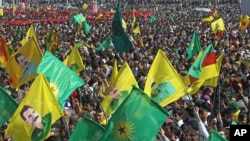Turkey and the rebel Kurdistan Worker's Party, or PKK, are in the early stages of what could become negotiations to end nearly three decades of bloody struggle.
Jailed PKK leader Abdullah Ocalan has called for a cease-fire and a withdrawal of armed PKK militants from Turkey.
There have been previous attempts to end the conflict, but regional experts say the new peace overtures look promising. Analysts say both Turkish Prime Minister Recep Tayyip Erdogan and PKK leader Ocalan are motivated to resolve the conflict.
Soner Cagaptay is the director of the Turkish Research Program at the Washington Institute for Near East Policy. He said on VOA's Encounter program that Erdogan has broad political ambitions and wants to put Turkish-Kurdish unrest behind him.
"He wants to become president. He wants to make sure that terrorism and violence do not become 'issue number one' because then, there is no way that he’ll be elected as president," said Cagaptay.
Cagaptay also said the prime minister wants to raise Turkey's international stature - another goal that increases his desire for a negotiated settlement.
"He wants to make Turkey a regional power. I think he realizes that Turkey cannot rise and become a regional power if it has this ongoing festering conflict," he said.
Center for American Progress policy analyst Matt Duss agrees. He said both Erdogan and Ocalan have an interest in resolving the conflict.
Duss added that Ankara's bid to host the 2020 Olympics could serve as an incentive for both sides to seek peace.
"Clearly, Turkey is making a major play for the Olympics and they understand that, among other issues, the Kurdish issue is one that hurts them and if they are able to resolve this, it increases their chances. So I would say Ocalan is probably smart enough to know that this was an opportune moment for him to step forward and offer this opportunity," he said.
Duss said he is "cautiously optimistic" that talks between the PKK and Turkish government will go forward. He said such progress could be beneficial for Kurds struggling for national identity in neighboring Iran, Iraq and Syria.
"The Kurds have consistently been the losers in the various machinations of the Middle East over the past century, century-and-a-half. This is an ethnic group that has found itself divided between these various countries," said Duss.
Although Kurds have struggled in much of the region, one potential sign of progress is in Iraq.
Turkey's reliance on oil imports has prompted it to forge ties with the Kurdistan regional government in northern Iraq.
Cagaptay said Turkey's trade relations with Kurds in the oil-rich and largely autonomous region of Iraq could be a catalyst for it to improve relations with Kurds at home and elsewhere in the region.
"If Turkey makes nice with its own Kurds, after having made nice with Iraqi Kurds, and is now looking to build influence in Syria, it is a way for Turkey to also build influence among the Syrian Kurds," he said.
Earlier this month, Turkey gave another indication that it is serious in its efforts to resolve the Kurdish conflict.
The government announced the creation of a committee of so-called "wise people" - more than 60 men and women from various backgrounds. The committee members are traveling across Turkey to promote an end to the strife between the government and PKK rebels that began in the early 1980s. The conflict has resulted in nearly 40,000 deaths.
The PKK initially demanded an independent Kurdish state, but later limited its goals to greater autonomy and cultural rights for Kurds.
The Turkish government has met some of the Kurds' demands. Erdogan's administration has approved measures that include new language rights and a Kurdish-language television station.
Even so, it is still too early to tell if these incremental steps and the new overtures from PKK leader Ocalan can help ease he tensions that have strained relations between Turkey and its Kurdish population.
Analysts See Chance for Peace in New PKK Overture




